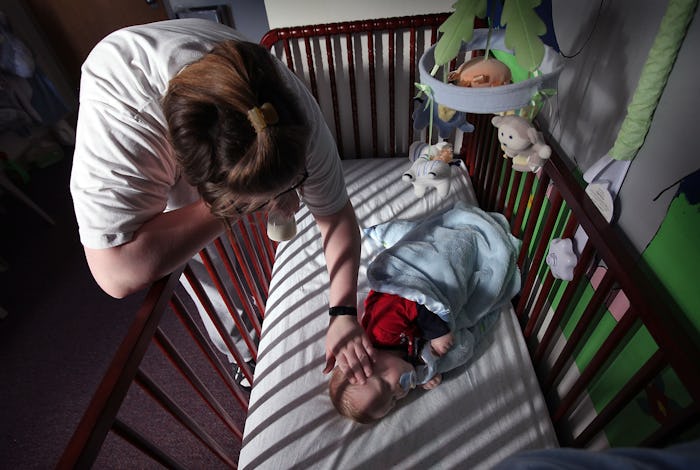Life

6 "Gaps" Moms Still Face That Shouldn't Be A Thing
Moms get less sleep than dads. Mothers around the world (including this one here) know that to be true. But in case you wanted scientific proof, a new study published this week found that women with children are more likely to be sleep deprived than men with kids or people without kids. Let's just add the gender sleep gap to these other six "gaps" moms still face that make life even harder to manage.
Moms make less than dads. Moms are less likely to get hired. Most moms (and dads) have little to no access to family leave. Moms take care of most of the chores. Moms get less time to themselves. Moms experience less sexual pleasure. Those are just some of the ways that women with children struggle at home and at work. And these gender gaps are far different when you break them down by race and income. Mothers of color and low-income mothers face discrimination and inequality at higher rates than white women with children and mothers who earn high wages. Federal policy could help alleviate much of this disparity, but Congress has continually stonewalled efforts during former President Barack Obama's two terms, leaving the country at square one.
The Gender Wage Gap
The gender wage gap is real. Women get paid less than men, and it gets worse when you break it down by race. Black women working full-time make 63 cents for every dollar paid to a white man, according to the National Women's Law Center (NWLC). For Native American women, that's 58 cents. Latinas make the least — 54 cents to every white man's dollar. The NWLC also found that mothers make far less than fathers — $40,000 a year compared to $56,000 a year on average. That breaks down to 71 cents per every dollar a man with kids earns. It's also two cents less than what a women without children earns full-time.
The Career Gap
In addition to less pay, mothers also have less career opportunities. According to the Pew Research Center, moms are less likely to be hired for jobs and more likely to be turned down for promotions because they have kids. Fathers, on the other hand, are more likely to be hired, as well as earn higher salaries, than men without children, according to the New York Times. Add that to the fact that people who are pregnant on the job still face discrimination at every turn, and have little legal recourse to fight said discrimination.
The Paid Leave Gap
It's a well-known fact that the United States is one of only a handful of countries that does not have a federal paid leave law. Research shows that without paid parental leave, moms — particularly low-income mothers — are less likely to go to work, according to Pacific Standard. Not only that, but states that have implemented their own family leave law apply different standard to mothers and fathers, with fathers getting little to no paternity leave. That affects their relationship with their kids and their partners, and also ignores same-sex couples and single dads. President Donald Trump is following that pattern — his family leave policy excludes dads and same-sex partners too.
The Chore Gap
A 2015 Working Mother Research Institute survey found that working moms in dual-income households are responsible for the majority of chores. Other studies have found this to be true for all mothers, according to TIME Money. So in addition to being sleep-deprived, mothers also have to carry the workload around the house.
The Leisure Gap
Moms just want to relax, but dads are the ones who get the break. A 2013 Pew Research Center analysis found that fathers in the United States get about three more hours of leisure time per week than mothers. You read that right: Three more hours per week. That adds up to about 12 more hours a month, give or take. And what are fathers doing with this time, you ask? According to the Pew Research Center, watching television or using other forms of media.
The Orgasm Gap
Not being able to orgasm is not particular to moms, but it's still on the table. Research has found that women experience orgasm far less than men. And by far less, I mean double-digits. According to Psychology Today, one study found that 39 percent of college-age women and 91 percent of college-age men reported having orgasms usually or always during sex. That's a 52 percent difference. Psychology Today also pointed to two other studies that found a 17 - 19 percent gap in orgasms between women and men.
Not only do fathers enjoy more leisure time, they also get more enjoyment during sex. And more money. And better jobs. And more promotions. It's 2017. Why is this still a thing?